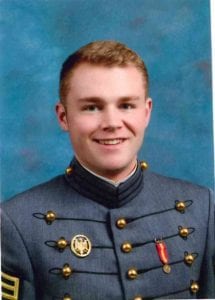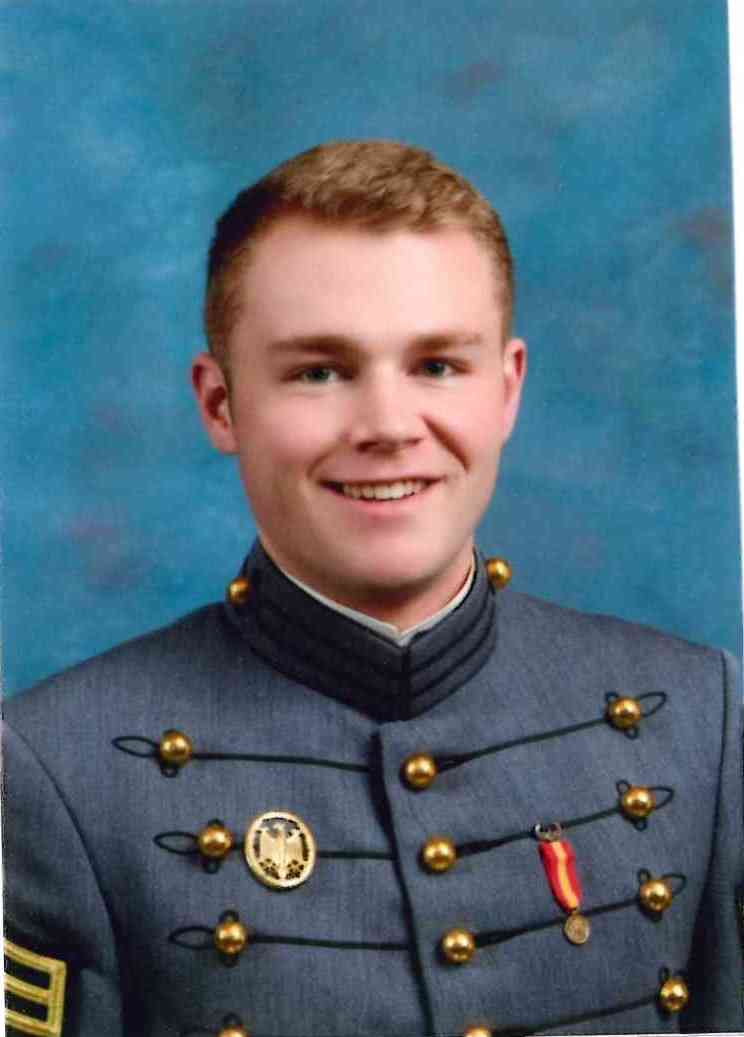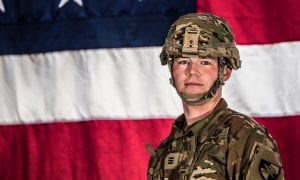
Cadet Lieutenant Harry Reed, a native of Southwick and graduate of St. Mary’s Parish School. (Photo submitted)
WESTFIELD- West Point is one of, if not the most well-known military academy in the world. Many are aware of its prestige, but there are some within the institution who believe that not enough people understand what the life of a student there looks like.
Harry Reed is a 22-year-old Cadet Lieutenant in the U.S. Army in his senior year at West Point. Having grown up in Southwick and attended St. Mary’s Parish School, Reed believes that Western Massachusetts is underrepresented at the military academy in New York. One requirement for Reed and his classmates is that they take part in two public speaking engagements while they are out on spring break in the second week of March. One of Reed’s chosen speaking engagements was to speak to The Westfield News to advocate for his soon-to-be alma mater, and hopefully get more interest in West Point from students in western Massachusetts.
“They look for people who are well rounded and do well in school,” said Reed, “and people who are involved in sports and leadership inside and outside of school.”
Reed described the lengthy process of being selected to attend the academy. In order to even be considered, one has to be nominated by their local Representative or Senator in the state’s congress. In Reed’s case, he was nominated by Congressman Richard Neal. Across the country, 4,000 people can be nominated for each class year. When those 4,000 nominees go to West Point, they are narrowed down to about 1,200 students. The process is the same for the U.S. Naval Academy in Annapolis, Maryland and the Air Force Academy in Colorado Springs.
“The reason why myself and another member of my school got selected is because western Massachusetts is underrepresented at West Point,” said Reed, “I think they want more outreach. Right now, at West Point, I only know three other people from Western Massachusetts.”
Reed added that each State Representative can only nominate five people from their district at a time, and each State Senator can nominate 10 people.
He also emphasized that West Point was more than just a boot camp, it’s a college where one can earn a Bachelor of Science degree. When Reed graduates from West Point in May, he will have a law degree in addition to his military training.
“It’s a liberal arts school,” said Reed, “They want a well-rounded, well-versed person with a broad knowledge in all fields of study to go into the army.”
Unlike a typical university, however, West Point has a far more structured schedule for its students. Depending on if one is an athlete or not, they may wake up at 5:30 each day. They will then enter morning formation at 6:50 to go to breakfast from 7-7:15 with classes from 7:30 to noon, followed by a brief lunch and then more classes until 4 p.m.. The moment one wakes up to when they fall asleep is scheduled, a stark contrast to the normal college system where the schedule is designed by the student. The major sticking point for some people considering West Point is that it is entirely free to attend.
“They try to induce stress by taking as much of your free time as you can and filling it with stuff to do,” said Reed, “Everyone is required to be on some kind of team. That can range from being a division 1 athlete to being on an intramural team.”
Reed is a part of the military skills team, a group that competes by showing off basic and advanced military skills on which they are judged against a rival team. These skills range from marksmanship to combat trauma care to navigation. In April, rival teams from across the United States and 40 international teams will come to West Point to compete in the Sandhurst competition. The event will be televised on CBS for the first time this year.
In addition to having to be on a team, each student must also have some form of job, with different tiers of positions based on one’s class year. Freshman are typically responsible for themselves, and given menial tasks like sweeping or cleaning. Sophomores are responsible for a single Freshman, and in a way, they act as a mentor to them in the beginning. Juniors can be in charge of seven to 120 Freshman and Sophomores depending on the position they are given. Seniors, such as Reed, can be given more administrative positions, or be put in charge of the entire corps of 4,400 people.
Reed said that he doesn’t think enough people fully consider the benefits of attending a place like West Point. He noted that the opportunities for travel, leadership experience, training, and a degree should entice more people to seek a nomination. For those who do not want to sit in a packed lecture hall every class, West Point typically has small class sizes. Reed said that his largest class had about 14 people, and West Point has been voted to have the most accessible instructors in the United States.
West Point, for many reasons, is not like a typical college, and certainly is not for everybody. A prospective student should begin the process of applying in at least their Junior year of high school. Reed, who knew he wanted to join since he was 12, said that he sent a letter to Representative Neal stating his intent to apply to get himself to stand out and increase his odds of nomination. Other requirements include keeping out of trouble in school and keeping one’s grades high.
“It’s pursuing leadership outside of what is normal,” said Reed.
In the summer between his Junior and Senior years in high school, Reed attended a program to live like a cadet for a week at West Point. After that week, he finished his application and received his nomination on Christmas Eve. By the end of that January, he had been accepted to attend West Point.
Summers between each year at West Point are naturally different as well. There are training requirements that are given to the cadets each summer, with the skills and training advancing each year. In the first summer, one learns the basic skills of being a soldier, how to operate all of the various weapons systems used by the Army, and survival skills. The second summer is a four-and-a-half-week period spent in the woods in which the cadets practice missions. The third year is a leadership detail where the cadet will go back and basically lead basic training. Finally, in the last summer, a student will shadow a 2nd Lieutenant in the job, branch, and location they want to eventually take part in.
The final requirement is a 12-day exercise where the entire platoon runs two missions per day. Each cadet is given a gun with blank rounds and will be randomly given missions as if they were in a real war situation. Each cadet will be given the opportunity to be the leader for a mission as well.
After he graduates from the academy, Reed will enter a five-year mandatory period of serving in the army. As of now, he will join the 2nd Brigade of the 101st Airborne Division in the army as a field artillery specialist. After he and his classmates graduate, they will have 60 days of leave before being sent for job training. Reed has been assigned to Fort Sill in Oklahoma, where the U.S. Army Field Artillery School is located.
The discipline and leadership experience learned at West Point is something a lot of young people from western Massachusetts could benefit from. West Point offers the benefits of both attending college and joining the military, for those who cannot decide on which they would rather do, and it’s free to attend.
“It’s rooted deep in traditions that have been built on by former U.S. Presidents and American leaders for over 200 years,” said Reed, “There’s a ton of history. Walking around there is literally like a museum.”








